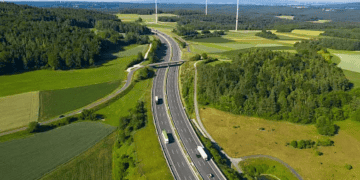Maersk, a global leader in logistics, operates over 600 self-managed logistics facilities worldwide. As the company plans for expansion, it is simultaneously focusing on enhancing the sustainability of its operations. This commitment is particularly relevant in today’s market, where there is an increasing demand for transparency and emissions data in supply chains.
Expanding Facilities with Sustainability in Focus
Maersk’s growth strategy includes expanding its global footprint of logistics facilities, encompassing dry warehouses, cold stores, and container depots. The aim is to provide customers with a comprehensive integrated logistics experience, with an underlying commitment to sustainability.
Net-Zero Emissions Target by 2040
Maersk has set an ambitious goal to achieve net-zero emissions by 2040. To support this target, the company plans for at least 90% of its operations to rely on renewable electricity and non-fossil fuels by 2030. This initiative is part of a broader energy transition program designed for Maersk’s logistics facilities.
Key Strategies for Decarbonization
- Energy Performance: Improvements in building design and the integration of energy-efficient technologies are at the forefront. Maersk aims to reduce electricity consumption through enhanced insulation, LED lighting, and smart HVAC systems.
- Electrification of Equipment: A significant shift towards electric power for equipment and assets is underway. Maersk’s goal includes the complete electrification of indoor equipment by 2030. Collaborative projects are also in progress to introduce electric reach stackers and empty handlers for container handling.
- Renewable Electricity Use: Maersk is actively working to power its facilities with renewable energy. This effort involves collaborations, Power Purchase Agreements, solar panel installations, and wind turbine projects.
- Building Certification: Pursuing certifications from LEED and BREEAM for new logistics facilities is part of Maersk’s strategy. These certifications reflect the company’s commitment to eco-friendly construction and operations.
- Natural Refrigerants: The use of natural refrigerants in cold storage facilities demonstrates Maersk’s innovative approach to reducing the environmental impact of its logistics operations.
Sustainable Investments and Retrofitting Existing Facilities
New investments must align with these sustainability criteria from the beginning or have a plan to comply by 2030. For existing facilities, Maersk is developing energy transition roadmaps in collaboration with local teams to ensure the 2030 targets are met.
Broader Sustainability Efforts
Moving forward, Maersk’s sustainability efforts will include focusing on building materials, packaging materials, and addressing scope 3 emissions. The company has already launched its first low-emission facilities, setting a precedent for a greener future in logistics operations.
Discover supply chain logistics news updates on The Supply Chain Report. Free international trade tools are available at ADAMftd.com.
#Maersk #Logistics #Sustainability #NetZeroBy2040 #EnergyTransition #RenewableEnergy #Decarbonization #ElectricEquipment #LEEDCertification #BREEAM #NaturalRefrigerants #SustainableInvestments #GreenLogistics #LogisticsFacilities #ColdStorageInnovation #SmartHVAC #EnergyEfficientDesign #MaerskExpansion #LogisticsInnovation #SustainableOperations #LogisticsIndustr













